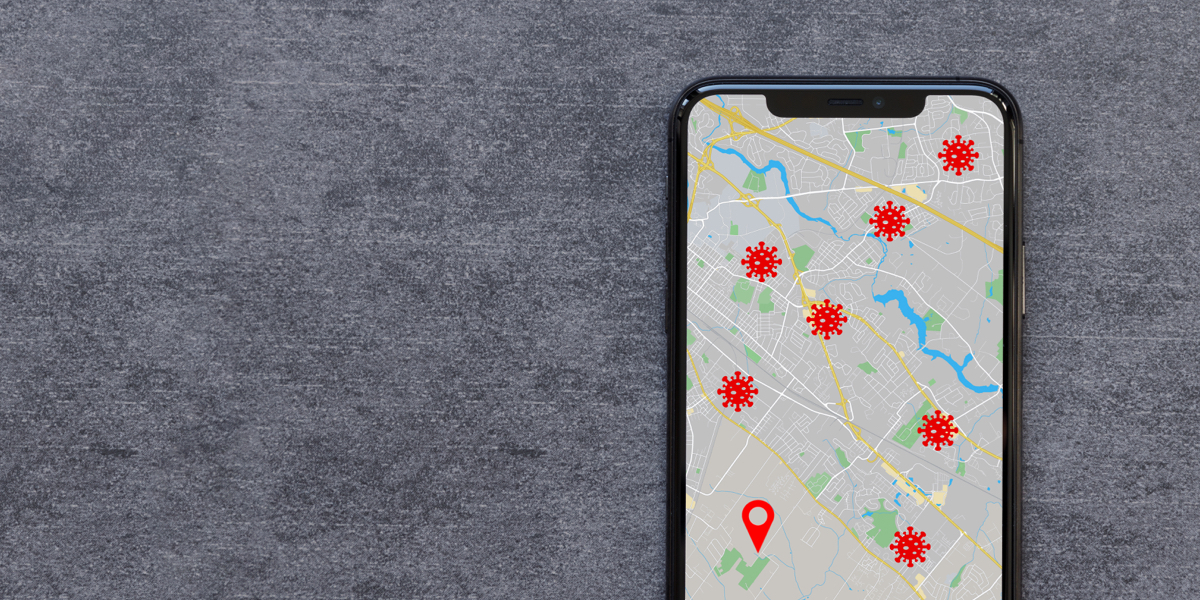The COVID-19 pandemic has been challenging for everyone. From students to business people, everyone has found life difficult during the lockdown.
Businesses, in particular, have suffered severe losses, especially small-scale storeowners, whose primary asset was their storefront and physical location for generating traffic and sales. Many large-scale industries had to shut down as well due to lockdown and shortage in supply of raw materials, for example, the tourism industry and manufacturing industries.
On the other hand, the COVID-19 era might be the pinnacle of digitization as the mobile app industry grows and expands post-lockdown. Mobile apps are now more than just a marketing platform for businesses; they are a survival tool, as mobile usage increases during the pandemic.
Recent statistics show a surge in the number of app downloads for diverse industries, including education, healthcare, on-demand food delivery, and more.
That said, businesses need to upgrade app design and features to ensure exceptional performance and user experience, as well as to survive the increasing competition. Meaning, as the dark clouds of COVID-19 roll past, the digital world would not be the same.
The blog highlights some of the top mobile app development trends that will make the new normal in a post-COVID-19 era and applications that made survival a little bit easier.
Post COVID-19 Trends in the Mobile App Development Industry
Here are some emerging trends in the mobile app development industry that will revolutionize the post-COVID-19 world:
AR/VR Technology
With everything on lockdown, many users have turned to online shopping for their day-to-day necessities. Plus, the 5G network not only provides a fast internet connection, decreasing load time but also improves image quality, which further enhances the experience of AR/VR.
It encourages mobile app developers to integrate AR/VR in their mobile apps, allowing users to experience retail shopping in a 3D virtual environment. That said, post-crisis, AR and VR immersive technology will see an exponential rise in demand.
AR-enabled applications like retail apps can feature virtual dressing and trail rooms. Similarly, healthcare apps can use technology to provide medical diagnosis, treatment, and therapy. It can also help medical professionals to understand the ailments and conduct follow-up with their patients.
Education, finance, and furniture apps are other app categories that can benefit from the integration of AR and VR.
Even after coming out of lockdown, it will be essential to exercise precaution until there is a vaccine or proper treatment available. In which case, AR/VR-integrated apps will allow users to enjoy a virtual shopping experience without stepping into crowded malls.
Artificial Intelligence
AI integration enhances the user experience for healthcare, banking, retail, and food delivery apps, among many others. Following COVID-19, it is another technological advancement that will lead to a digital revolution, when used with Blockchain, IoT, and Cloud computing.
It will permeate every industry, enabling entrepreneurs to provide personalized experiences, enhanced security, and more by way of mobile apps. AI-powered chatbots, in particular, will witness a significant rise post-COVID-19.
With social distancing in place, businesses had to find alternative ways to communicate with their clients and consumers. It led to a global usage of chatbots as they drive information via text or voice-based interactions.
That said, not only are chatbots capable of answering all questions and concerns for consumers, but most users prefer to interact with the AI-powered system than humans. Meaning, chatbots are a cost-effective solution that is likely to stay for the long-haul post-COVID-19 instead of hiring a customer support staff.
Beacon Technology
Beacon technology is an evolution in location tracking and proximity marketing within the mobile app development arena. It is gaining recognition in diverse industries, including healthcare, hotels, museums, and more.
It helps provides a personalized experience for the user based on their location. For example, retail apps can use Beacon technology to provide personalized offers and discounts. Hospitality apps like hotel booking apps can allow secure check in-outs via the apps, as well as access to information on amenities, vacancies, activities, and more.
Similarly, event apps can use Beacon to automate check in-outs, offer convenient registration, real-time indoor navigation around the arena, and more. Sports apps can help locate seats within the stadium, refreshment seats, promotional deals, and more.
Various other industries can make use of Beacon technology, including logistics and fleet management apps, retail, healthcare, real estate, education, and travel. With such a vast use, it will likely continue to grow and expand post-COVID-19.
In-App Transactions
As mentioned before, until a vaccine or treatment for COVID-19 is available, it’s essential to practice proper precautions, including social distancing, avoiding contact, and more. That said, online transactions through mobile apps will see an exponential rise in the post-crisis era.
From financial management to service subscriptions, online banking, and more, these apps have witnessed tremendous growth in the number of downloads and usage during the lockdown. With enhanced security measures and convenience, the trend is likely to continue post-COVID-19.
Importance of Mobile Apps During the Pandemic
While the mobile app development industry has seen an exponential influx of profits, not all apps have experienced the same level of success during the pandemic. That said, for some app categories, usage might slow down post-lockdown, whereas others will likely continue far in the future.
Here are some categories of mobile applications that have made life convenient despite the challenges brought forth by the pandemic and lockdown:
On-Demand Grocery Apps
On-demand grocery apps are one of the top app categories to witness a surge in the number of downloads and usage. According to statistics, the number of downloads hit 106 million between March 29 and April 4 of 2020, with Walmart, Shipt, and Instacart leading the polls.
They offer a swift service, contactless payment, and delivery, which is why people seek these apps as their savior in these troubling times. That said, the demand for on-demand grocery delivery apps has increased as the pandemic continues.
Plus, for businesses, it is not only a startup opportunity but also a way to ensure customer satisfaction and boost their revenue.
Education Apps
Education is one sector severely affected by the pandemic. But technology and mobile apps have made it possible for individuals to continue learning online despite the lockdown.
That said, education apps are another app category that is in demand during the COVID-19 crisis. For young children, educational gaming apps are not only entertaining but also help them refresh what they learned.
Additionally, other education apps, like language learning apps, witnessed a surge in the number of downloads. Not just students, but working-class individuals also avail their time in quarantine to enhance their existing skills and gain new ones.
Healthcare Apps
With the hospitals flooded with Corona patients, other medical patients find it challenging to meet their doctors. It has led to growth in the demand for healthcare apps.
Aside from purchasing medicines and medical kits online, these apps also allow doctors to check up on their patients, offer consultations, tests, and prescriptions. Social distancing further emphasizes the importance of our digital health tools.
That said, from home-test kits to self-reporting and tracking apps, healthcare mobile app development will continue to advance in the post-COVID-19 era.
On-Demand Video & Music Streaming Apps
With people quarantined in their homes, on-demand streaming apps have also witnessed a surge in the number of downloads and increased usage. Students and the working class operating from home have turned to online music and video streaming apps to pass their time.
From Netflix, YouTube, Amazon Prime, and even Tik Tok are a few examples of streaming apps that have gained a surplus in downloads during the lockdown.
Social Apps
Even before the pandemic, social media had become an integral part of our everyday lives. But after the spread of the virus, it is not just a source of entertainment. Instead, it is also a way to connect with our friends and family during the crisis.
Facebook, Twitter, Instagram, all have experienced a surge in downloads and usage by users across the globe. WhatsApp, in particular, witnessed an increase in the number of video and audio calls during the lockdown.
Aside from communication and entertainment, social media is also a way for people to get updates on the pandemic in other areas of the world. That said, the updates on the global crisis and the constant connection with families is what enables these apps to make life more comfortable during the lockdown.
Communication Apps
Lockdown and social distancing laws forced companies and businesses to close up shop and switch to working from home. If not for communication apps like Skype, Slack, and more, continuing operations as smoothly as in the office would’ve been challenging.
Remote teams conduct meetings via platforms like Zoom, while teachers use it for online classes, to give assignments, and communicate with their students. Additionally, platforms like JIRA, Basecamp, and more allow teams to ensure a seamless workflow, despite the distance.
These communication apps not only make it convenient to hold conference calls, but also allow sharing of files, documents, and images of all sizes. It makes working from home a breeze during the pandemic.
Gaming Apps
Apart from social media and streaming apps, mobile gaming apps are another source of entertainment during the pandemic. For people in quarantine, they are a way to not only keep busy but to keep their minds active.
Mobile game apps have seen a phenomenal rise in the number of downloads during the lockdown. Families, young and older individuals are relying on multiplayer games, instead of single-player, as not only a way for entertainment, but also to engage with other people near or far.
What’s Next?
The trends in the mobile app development industry and the surge in the number of app downloads is evidence that the world post-COVID-19 will not be the same as we have known. The period of lockdown may be the boost in digitization, the world needed. Meaning, businesses are likely to embrace the advancements in mobile apps and adapt to the new normal.
That said, it also shows the importance of mobile apps and the scope of the mobile app development industry, which will continue to increase in the post-crisis era.
Mobile applications are not just a marketing tool for businesses; they are a survival gear for the organizations and the world as a whole. So, if you don’t have a mobile app, consult with our experts and keep up with the changing times.

